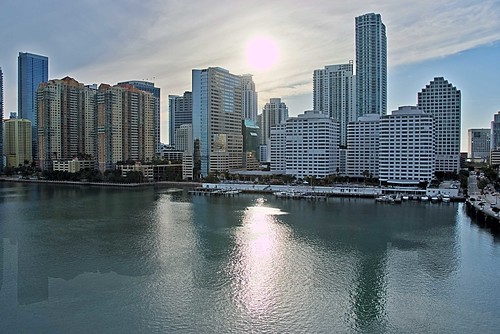Havana-Miami: Mr. Hyde & Dr. Jekyll (1)
By Alfredo Prieto

HAVANA TIMES, May 17 – The perceptions of Havana toward Miami cannot be understood accurately if one does not look at Cuban cultural views of the United States, for a long time characterized by a dual sense: rejection and attraction.
It has been said that being a Third World country, the self-comparison of Cubans to their northern kin constitutes a “natural fact,” which is manifest in the validation of Americanization in terms of personal success, economic efficiency and consumption.
These are ideas that exist not only due to Cuban-Americans’ prosperity in the United States-a fact magnified by the images that country projects when presenting these “golden exiles,” a managerial and executive elite-but are ideas that have also played a part in the fifty-year continuation of relatively uninterrupted conflict.
This cultural dynamic marks a difference with respect to what was established with Latin America, zigzagging and spasmodic over time, as I researched some time ago. And this is much more diffuse in the case of the Caribbean, where Cubans display few elements of self-identification, with perhaps the exceptions of Santiago de Cuba and Guantánamo provinces.
Today, I got up thinking a bit of Argentine poet Jorge Luis Borges, so I will write first about rejection.
The city of Miami has a privileged place on that scale for having established a very peculiar relationship with the island. It was a refuge for revolutionaries before the revolution and the door to direct entry to the “American way of life.” This was based on its communication networks, which were quite efficient for their time (recall that in the 1950s the Cuban middle class would go to Miami on weekends to buy products and consumer goods; others-those less fortunate-went there seeking work).
After 1959, following a revolution that overthrew an unpopular dictatorship, the structure of traditional power ended and the established mold of dependence on the United States was smashed.
Miami deepened its character as a safe haven to the fervor of anti-Cuba federal policy and became the center of actions against Havana’s new political order. It first became a refuge for war criminals and torturers from the Batista dictatorship, and later served as a place for the middle classes to resettle, arriving basically in two waves: 1960-1962 and 1965.

Those types left as exiles, behaving as such and cultivating the idea of a return to the “Lost Paradise,” created an entire industry of nostalgia around “Yesteryear Cuba,” which still functions today. “Small local newspapers” “municipalities in exile” and “open microphone radio shows” are three of their touchstones.
On this sediment operate-at a similar political-media level of the island-a discourse that feeds negative perceptions due to the activism of groups traditionally serving American political objectives toward Cuba, groups even involved in terrorists actions against civil and tourist facilities.
This generated a sense of national insecurity in a context in which the executioners have not been brought to justice for violating the Neutrality Act, and despite having publicly admitted their participation in the mid-air bombing of a Cubana de Aviation commercial airliner in 1976, an exceedingly sensitive problem for the Cuban leadership and people before and after September 11.
The cases of Posada Carriles and Orlando Bosch-the former who has yet to be tried or extradited to Venezuela and the latter pardoned by President George Bush (father)-are illustrative in this respect. This involves, in a nutshell, the same perception of the enemy.
Yet this enemy has other tentacles. Because of it political practices and cases of corruption and electoral fraud, Miami is perceived as a “Banana Republic”; surprisingly, this has been a quite common image held by sectors of Anglo society, especially during the Elian Gonzalez case.
The records of this sort of historical memory are ordinarily efficient; also, like those Anglos, they recognize the participation of Cubans as members of the dark side of the Force: the assassination in Dallas, the Watergate plumbers, the murders of Che Guevara and Orlando Letelier, the School of the Americas, the Iran-Contras scandal and a long list of other machinations confirmed by the persistent reality of facts.
Last but not least, there is the existence of a politically conservative Cuban-American elite involved in congressional lobbying and occupying positions of power in different posts of the federal government. This has had a certain impact on the formulation and implementation of policy toward the island; it unleashes reactions of connection and continuity with the annexationist culture of the 19th century, and with diverse expressions of that today.
This is the face of Mr. Hyde.






Cuban Exiles in Miami ironically love real TERRORISTS and CIA backed killers, like Luis Posada Carriles (“South America’s Bin Laden” who blew up Cubana Flight 455 in 1976), Orlando Bosch (his partner in crime), Felix Rodriguez (point man for Oliver North in Iran/Contra, trained central American contra death squads, ordered execution of Che Guevara), Alpha 66, Brigade 2506 etc all blow up Havana hotel lobbies, strafe beaches with gun fire, poison crops etc
Go to Versailles restaurant in…
It’s not surprising that Miami has become a cacophous din of Batistiano right-wing idiocy. The white, old, bitter, and fading exile geriatrics in Calle Ocho have never been able to see their dream of a return to oligarchy come to fruition.
Little Havana / Miami – replete with parasitic Gusano cast offs, and former BRAC goons of the brutal Mafia backed Batista apparatus, has always been ground zero for every kind of liar, fraud, and CIA bootlicker that the anti-communist financial ponzi…
Observe the Miami waterfront: verticle, contemporary, ahistorical. Gone are those skyscrapers from the 1920’s with more character, to be replaced by a legion of souless white phalli. Miami is now (one of the) ground zero(s) of the housing crisis (and also, of commercial real estate) due to overbuilding, overindebtedness and utter disregard of and alienation from the natural environment.